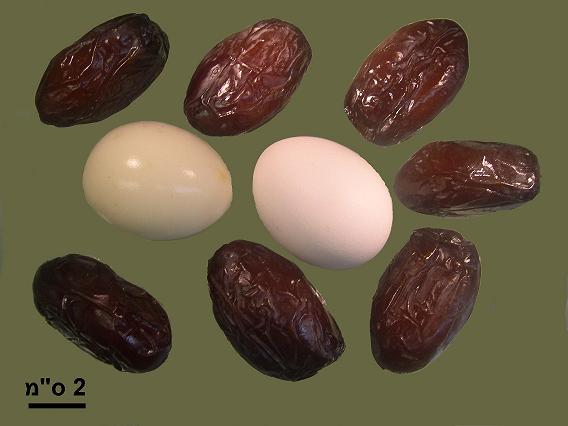At Bar-Ilan University, a super-giant date was developed * at Ben-Gurion University, new varieties of pomegranates are of great commercial value due to their early ripening

Scientists from the Faculty of Life Sciences were able to combine the desire to provide consumers with larger dates and also to help the sick and observant elderly to observe the Yom Kippur fast, while still being allowed to eat a date in a volume of about 30 cc. This lesson is based on a large date palm of a variety that was common in Israel during the time of the Sages called "Kutvet".
Prof. Mordechai Keslo and Dr. Orit Simhoni from the Faculty of Life Sciences at Bar-Ilan University, who studied the ancient varieties of dates in the Land of Israel, came to the conclusion that there are no trees in the land today that are considered descendants of the ancient varieties, including the variety whose name she used to write.
Since the days of the Sages, there has been no continuity in the cultivation of date varieties in Israel until today, and generations of rabbis have searched for dates in a suitable volume without success. And here it turns out that in the XNUMXs it is actually possible to get the 'rude writer' type in Israel for anyone who wants it. Prof. Keslo and Dr. Shimhoni from the Faculty of Life Sciences at Bar-Ilan University, in collaboration with Gideon Ziv from Kibbutz Yatbata, came to the conclusion that fresh dates of the Majhol variety, super-huge size, are suitable for the 'Kutvat Gessa' lesson according to the Halacha.
The date experts explain that the return of the date to the Land of Israel began in 1920, and today there are about 10 commercial varieties brought from Iraq, Egypt, and the Atlas countries that are intended for local consumption and export, among them the Majhol, the Majhol that comes from the great desert oasis of Tafillet in the south - Eastern Morocco on the border of the Sahara, arrived in Israel in 1949 and with the help of modern date farming developed to extremely large dimensions and became the most sought after variety in Israel and the world.
The scientists explain that the large fruit is created by diluting the flowers or fruits using different methods and in the next issue of the BDD journal, which deals with the connection between Torah and science, a detailed article on the subject will be published. Now, the researchers hope, the halachic judges will finally be able to rely on the Majhol date known as the appropriate unit of measurement for the permitted amount of eating for the sick on Yom Kippur.
Pomegranates that are early to ripen
At Ben-Gurion University, new varieties of pomegranates with great commercial-market value were developed, and this is due to the fact that the researchers were able to advance their ripening to the months of July-August, compared to the familiar varieties of the pomegranate, which ripen towards September-October.
The development of the new varieties is being carried out as part of multidisciplinary research, led by Prof. Zeev Weissman, in the laboratory for the biotechnology of vegetable oils, as part of the expansion of infrastructure for the pomegranate industry in the Negev. As part of the research, the researchers carry out genetic improvement of the outstanding types and cultivate the varieties of the future. Simultaneously with the development of pomegranates for fresh marketing, research and development of pomegranate oil with unique properties is underway, which is in advanced stages. Recently, a number of articles have been published in first-class scientific journals in the field of food technologies and nutrition and health. These studies and developments place Prof. Wiseman's research team at the forefront of professional research in this new and interesting field in the world.
The beginning of the research, in 1998, after a series of special pomegranates from Central Asia were brought to Ben-Gurion University, at the initiative of Prof. Dov Pasternak. In the first stage, a selection was made of outstanding types in terms of early ripening (as mentioned, July-August instead of September-October) and characteristics of external and internal color and exceptional taste. This research phase has recently ended, and the university's implementation company, 'B.G. Negev Technologies' recently registered the outstanding types as a patent and entered into a business relationship with several bodies in Israel and around the world.
According to Prof. Wiseman, the second phase includes genetic improvement of the outstanding types and the cultivation of future varieties. This research is in advanced stages and should continue for a few more years." In addition, we are promoting and assisting a number of producers and small industries in the southern region of Aker to develop a sophisticated production of natural pomegranate products from all the components of the fruit, juice and oil. We focus our activities on a number of sites in the Negev, from the Arabah, through the Negev Mountain, Beer Sheva, Nitsanim to Neve Mevat. In addition to this, we are partners in a comparative study of pomegranates that is carried out all over the country," says Prof. Wiseman. The extensive research activity in this research field was made possible by the support of the Dibner Foundation, the Israel Goldman Foundation and partially by the Ministry of Agriculture."

2 תגובות
Only that the development of the size will not harm the taste and the great nutritional value of the date
Pomegranate is a problematic fruit in the way it is eaten. It is not easy to eat.
Let them invent a pomegranate without the inner shell. But I'm quite tired of giving ideas to others.
: )